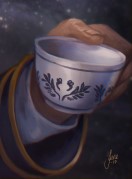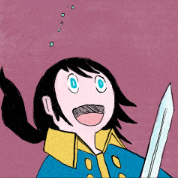|
It's the return of the GUMSHOE and investigative gaming thread! How to run, why to run, good adventures, experiences and suggestions with investigative gaming, all that good stuff. Pure mysteries kind of come with their own problems separate from heroic fantasy gaming or superhero games. Please don't let my initial focus on Gumshoe stop you from talking about investigative gaming in other systems. What is the Gumshoe system? The Gumshoe system is a role-playing system created by Robin D. Laws (author of Feng Shui and co-author of Over the Edge) which is designed to solve a problem in traditional RPG games with an investigative component, such as Call of Cthulu or Unknown Armies. The problem is that traditional games with traditional skill systems require dice rolls to collect information and clues (such as Spot Hidden, Library Use, etc) thus having a possibility that the players won't get a needed clue and therefore won't progress. When the dice rolls go bad, the mystery literally stalls out or grinds to a halt while the Game Master tries to figure out a different way to get the clues to the players. As Laws puts it, "This is like playing Dungeons and Dragons, and rolling to see if there are monsters with treasure to fight in the dungeon." So Gumshoe does away with this. In Gumshoe, there are two classes of skills: General Skills and Investigative Skills. Investigative Skills are handled differently than skills in almost any other system. If a player has an Investigative Skill and uses it to find or analyze a clue, they succeed automatically. This is such a radical departure from most-skill based systems that some people's heads explode at the thought of it. They simply do not see how this would work in play. Let's be clear: the players do not simply show up at The Crime Scene or The Old Warehouse and start robotically listing out their Investigative Skills to get clues. Everything proceeds as it normally would (the players describe their actions, such as searching under the sink or checking the labels on the crates) except that when it comes to the time where (in most games) you would roll to see if the characters find the clue, in Gumshoe you don't roll and simply provide them with the clue provided they have the appropriate skill. All non-clue challenges in Gumshoe use General Skills and are resolved by rolling a single six-sided die and attempting to meet or exceed a Difficulty number, which is usually 4. So the average task has a 50/50 change of success or failure - but wait! Players can spend points from their skill pools (categories such as Scuffle, Driving, etc) to add to the result of their role. So 3 points gets you guaranteed success on a regular roll. However, these spent points don't come back until the next adventure. Also, all roles are "player-facing" whenever possible i.e. if an NPC is trying to sneak up on a player, the player rolls their Sense Trouble skill rather that the NPC rolling their stealth skill. You can also spend points in Investigative Skills whenever you find a clue to potentially unlock more information (i.e. if a character has a geology of 2, they can spend a point when they find a magic rock to get the place it came from, how it was formed, etc.) You'll never need to spend points in Investigative Skills to get "core" clues, but spending them can get you extra information or an advantage later. When you combine the simple, player-facing mechanical resolution for challenges with the core investigative system, Gumshoe becomes a very easy, free-form, light-weight system that allows players to puzzle out mysteries without bad mechanics side-tracking the proceedings. What's using the Gumshoe system? There are presently five settings that use Gumshoe. All five of these games use the basic Gumshoe rules, but add and subtract certain skills based on the narrative needs of the game. For example, you won't find Cthulu Mythos in Mutant City Blues or Energy Signatures in Night's Black Agents. The five settings are: The EsoTerrorists/Fear Itself - EsoTerrorists was the first Gumshoe setting published and the lightest in terms of rules and setting. It got a 2nd edition that adds some additional setting info and a lot of GM advice. The players are members of a secret society called the Ordo Veritas and are privy to a terrible secret: that outside the bounds of reality, in a realm of deadly chaos called Outer Black, are horrible creatures that seek to destroy us. The only thing holding them back is the fact that the average person doesn't believe in them; if this were to change - if the general population became aware of and believed in the existence of these supernatural horrors - reality would come crashing down and the planet would become devoured by nightmares. Fear Itself takes place in the same world, but the players are regular chumps against the darkness. The EsoTerrorists/Fear Itself is basically X-Files: Ripped from the Headlines. Robin D. Laws suggests that you take current strange events and give them a nasty twist, then let the player-investigators figure out that it's the work of the EsoTerrorists - nihilist cultists who seek to let the terror of the Outer Black into the world by either creating horrible events or by upping the intensity of naturally-occurring ones. This is a well-constructed setting that makes a great grab-bag of concepts and ideas that you can poach from if you're not interested in running it "straight". Trail of Cthulu - This was my entrance point into Gumshoe. Trail of Cthulu is the Gumshoe version of Call of Cthulu, the venerable RPG of investigations and insanities in the H.P. Lovecraft mythos. In actual play, it tends to emphasize clue-finding and information gathering over fighting eldrich terrors. In fact, player-investigators can have a skill in Fleeing (and it's emphasized that you should put some points into this), which shows you the kind of heavy poo poo you'll be dealing with, although it's also possible to run the game in "Pulp" mode (and there are special rules for doing so). The Sanity system is also better than the venerable "count it down and you're out" system in Call of Cthulu; you have two sanity tracks, one that tracks your moment-to-moment sanity (i.e. the kind that makes you scream or shake uncontrollably) and one that tracks your "worldview" or long-term insanity (i.e. you believe everyone has been secretly replaced by robots, or that all old ladies should be fed to the woodchipper), which helps drive players nuts without ruining their character long-term as Call of Cthulu is wont to do and can also mechanically model the "madman with a veneer of sanity" character. Trail of Cthulu has a couple of neat features over Call of Cthulu as well; one of them is that it actually gives you a dozen or so manifestations for each Old One so that you can sneak in a Hastur plot on your players without them immediately getting wise to it. One of the biggest problems with Call of Cthulu is that everyone knows the "mysterious" lore backwards and forwards; Trail gives you a bunch of different and differing ties to the mythos. Lastly, because Trail of Cthulu is the flagship product, it has the most supplements and adventures published for it. I recommend The Big Hoodoo, set in 1952 California and casting players as Robert and Virginia Heinlein, Tony Boucher, and Phillip K. Dick trying to solve the death of real-life satanist and rocket scientist Jack Parsons (based on a true event). It's a winner. Mutant City Blues - It's CSI: X-Men! 10 years after a strange flu epidemic gives 1 percent of the population super-powers, you work as a detective for the Heightened Crime Investigation Unit. Whenever a crime involves a mutant as either the victim or the perpatrator, you get involved with the investigation. Oh, and you're a mutant too. I'm going to be honest - I like this setting a lot; it's a little Wild Cards, X-Men, and JAG, with a lot of cop atmosphere that I dig on. Sadly, it looks like it completely flopped. There's been one book of adventures released and there's nothing on the horizon for it. Still, it's a well-made game with some really neat concepts. Super-powers are assigned using the Quade diagram, which serves as both a mechanical tool (you can't get both Telepathy and Flight; you have to buy your powers in groups and these powers are too far away from each other to be bought on the same character) and as an investigative tool (if the victim's brain has the tell-tale energy field of being probed by a telepath, but witnesses saw the perp fly out the window, you're dealing with two suspects). There's all kinds of cool tech on analyzing super-hero energy blasts, the legal ramifications of obtaining a warrant to enter someone's dreams, etc. Good stuff but, like I said, it flopped. Still, check this setting out if you want to reenact a scene from the Departed with Wolverine. *pops claws* "You picked the wrong cop, bub!" Ashen Stars - Gritty Battlestar Galactica meets Star Trek meets Firefly space opera (without the Whedon smarminess), with narrative conceits designed to overcome many of the traditional problems of Far-Future RPG gaming. The setup is that, 5 years after The Combine (basically The Federation from Star Trek) fought an incredibly costly and bloody war, the players are private troubleshooters on the fringe of the Galaxy (called "The Bleed") helping the Combine restore order to these sometimes lawless sectors. Lots of texture, each PC is highly encouraged to have a Dramatic Arc and the GM is given ways to drop these into the ongoing campaign. My opinion: this is an insanely ambitious game and the amount of detail and thought that has gone into it is jaw-dropping. I'm really not going to get into Ashen Stars much as I have only run one quick sessions. If you want to run an RPG set in the future this is problably THE BEST one I've ever read, and I've read a lot. Every page is just packed with 4 or 5 adventure ideas and technology and stuff that will actually work in a game. I am more excited to play this than Traveller or GURPS. Night's Black Agents - Jason Bourne vs. Dracula all over Europe. You were a spy. You quit the game, but decided to freelance a little a la Ronin. And you've discovered that your employers are vampires. What's worse, they know that you know this. Now the race is on...one of you is going to end up dead. Or worse. There's rules for running the game in Dust mode (where killing is never easy), Burn mode (your contacts, resources, and even people from your "real" life are targetted and destroyed by the vamps) and Mirror mode (who can you trust? Even other players might be colluding against you), and Thriller mode (where you are a bad-rear end fuckin' spy who can handle your poo poo, thank you very much). There's a toolkit for building vampires with historical sources (do you know how many different weaknesses vampires supposedly have, and how inconsistent they are across cultures? You will after reading this) or just using truly wierd ideas (Dr. Who-esque dimensional statues that rotate through hyperspace and zombify humans). Great stuff. Yes you can play it as a straight spy game without vampires, this is supported by the rules and parameters are given. Read the post below this one for impressions from gourdcaptain on the system. One more Thing There's also a Gumshoe mash-up with Pathfinder called Lorefinder. I have no idea what this is like and would like to hear someone's thoughts on this. I will add it to the "What's using the Gumshoe System?" section when I get some additional information on this. Links Pelgrane Press, Publishers of all Gumshoe games: http://www.pelgranepress.com/ Robin D. Laws, Designer of Gumshoe, Blog: http://robin-d-laws.livejournal.com/ Kenneth Hite, Designer of Trail of Cthulu, Blog: http://princeofcairo.livejournal.com/ Greg Stolze, who hasn't made Gumshoe but did make a noir game called A Dirty World which is really good and might give you a few ideas: http://www.gregstolze.com/ Megaman's Jockstrap fucked around with this message at 23:37 on Nov 5, 2015 |
|
|
|

|
| # ? May 3, 2024 04:55 |
|
Megaman's Jockstrap posted:If you've played Night's Black Agents I would love to post your impressions here. Right then. Not sure how much I can add, but I recently finished playing in a Night's Black Agents campaign last month that went for ~6 months. Played international spy coalition originally organized by the UN to investigate X-Files-style occurrences, ended up fighting alien colonialists who sold drugs that gave people psychic powers (and their government collaborators), becoming internationally most wanted criminals, and then winning and founding what's sort of a weird precursor to Firewall from Eclipse Phase (only minorly less jerkish). System itself was a lot of fun, but the main issues some issues with the combat system, and the most ludicrous skill combination known to man. FYI, the MOS rule (you have a single skill that is your specialty. Once per session, you may perfectly succeed at a roll involving it, no roll required) is pretty great to allow some awesome moments to shine for the PCs, as well as allowing the backbone of PCs plans to not fail for relatively stupid reasons or just anticlimactic bad luck. (You fail for completely different reasons. ) Combat System: Damage is 1d6+X, where X is the value of the weapon. The problem is a lot of low-end weapons like fists and even pistols have negative values like -3 or -2 on them, and the floor on damage is 0. So you do 0 damage on 1 in two hits with some weapons. It's INCREDIBLY FRUSTRATING. Makes things feel entirely too luck-based. Let alone the amount of damage disparity between a minimum damage hit and a maximum damage hit. There's an optional rule to instead floor it at 1, but this would still not do that much towards depleting most things health pools (and anyone with armor which is flat damage reduction would still take no damage), especially given the rules for "vampires" in the system are ridiculously hardcore and they take a lot of damage before going down, if brute force can even kill one. Which leads to the PCs just flat out refusing to fight one in a straight up fight, which I think is the point, but straight up fights can be frustrating due to the damage when you're just fighting human goons. (Group's agreed if we ever play it again to figure out a houseruled replacement damage system where things do fixed or much less swingy damage by weapon category.) The Insane Combo: A single PC with both Preparedness and Explosives as high general skills is completely insane in a hilarious way. Preparedness lets you if you have it at 8+ make rolls to have done things in the recent past that don't contradict things that explicitly occurred. (The "Just as Planned' moments.) Explosives are ludicrously lethal in Night's Black Agents. This lead to the other PC who had these two skills trying at every opportunity to have retroactively mined places, placed demo charges where we needed to get out, and so on. Although it did lead in the final session to me threatening people with the other PC placing explosives in their pants already somehow (he hadn't) and "even though I have no idea how he does this." Anyway, I recommend it, just keep in mind the combat system's a bit clunky for a spy game where the inevitable shootouts will occur.
|
|
|
|
gourdcaptain posted:Combat System: Damage is 1d6+X, where X is the value of the weapon. The problem is a lot of low-end weapons like fists and even pistols have negative values like -3 or -2 on them, and the floor on damage is 0. So you do 0 damage on 1 in two hits with some weapons. It's INCREDIBLY FRUSTRATING. Makes things feel entirely too luck-based. Let alone the amount of damage disparity between a minimum damage hit and a maximum damage hit. There's an optional rule to instead floor it at 1, but this would still not do that much towards depleting most things health pools (and anyone with armor which is flat damage reduction would still take no damage), especially given the rules for "vampires" in the system are ridiculously hardcore and they take a lot of damage before going down, if brute force can even kill one. Which leads to the PCs just flat out refusing to fight one in a straight up fight, which I think is the point, but straight up fights can be frustrating due to the damage when you're just fighting human goons. (Group's agreed if we ever play it again to figure out a houseruled replacement damage system where things do fixed or much less swingy damage by weapon category.) For anyone who hasn't read NBA, here's how the armor works: If someone's wearing a bulletproof vest or the like, they take one less damage from guns. If someone's wearing full-on body armor, they take two or three less damage from bullets and one less from everything else. So yeah, it sucks that you're that likely to do no damage at all but you won't get into the 50% odds of no damage range unless you're getting into a fist fight with a swat team. Okay, vampires can get a bunch of armor without wearing a big obvious suit of armor, but it's like gourdcaptain said. Vampires in this system are made to be horrible hardasses that you don't want to fight directly without being incredibly well-prepared. (Also, gourdcaptain is wrong, fists are -2 damage, small melee weapons are -1 and everything more dangerous than a knife is at least +0, with guns doing more damage at point-blank range. I'm not saying it's not a problem, but it shouldn't be as much of a problem as this paragraph's making it sound unless you only fight people in full spec-op gear.) EDIT: If that last bit sounds weird and accusatory just sitting there at the end, I don't mean anything by it. I just realized that the damage values only line up against enemies in the heaviest armor after I wrote the first two parts. Lurks With Wolves fucked around with this message at 21:47 on Mar 7, 2015 |
|
|
|
Lurks With Wolves posted:
I just think hitting to no effect even on unarmored targets shouldn't happen with any weapon - we've discussed shrinking the dice size instead in the future. gourdcaptain fucked around with this message at 03:24 on Mar 8, 2015 |
|
|
|
Good OP. I just bought the Mutant City Blues pdf and while I was planning on GMing something gritty and down-to-earth for my group using the police procedural rules, I've actually warmed to the mutant stuff so I might play it straight. It looks like a lot of fun. I am a bit concerned about the granularity of some of the rules. I hate when a game starts talking about 25 vs 50 metre distances based on how many points you put into a power, I don't think that level of precision is necessary for an RPG (and it reminds me of D&D in a bad way). If I'm gonna run it I'd want to do it a little more freeform, in an AW kind of style. Anyone have any advice for specific ways to override the basic GUMSHOE rules in that way? Particularly the combat system I think could be trimmed down significantly, and the need for NPCs to roll dice removed, which sounded easy at first but seems more complicated the more I look at the mutant power rules and all the stuff for blast powers and so on.
|
|
|
|
Se I'd heard of GUMSHOE, vaguely, but for some reason I thought it was a straight mystery type game and, personally, I like to inject a little of the fantastical into games, whether it be sci fi, fantasy, superhero or whatever. Mutant City Blues sounds like it's so my jam, and while I love mystery stories, I've never been confident running them in the stuff my group usually plays. It's sounds a little like Powers: the Game, and that's pretty rad.
|
|
|
|
Can anyone tell me about A Dirty World? I love hard boiled detectives and the noir genre so this might be the game I've been looking for.
|
|
|
|
LongDarkNight posted:Can anyone tell me about A Dirty World? I love hard boiled detectives and the noir genre so this might be the game I've been looking for. Well for one, it's a One Roll Engine game so you'd have better luck asking about it in the Greg Stolze thread. It's still a good noir game, though.
|
|
|
|
If you would like to see how A Dirty World plays out and like Actual Play recordings, RPPR has done a few games with it. http://actualplay.roleplayingpublicradio.com/category/systems/ore-system/a-dirty-world/ It is a One Roll Engine game, but it works a little differently from Wild Talents or Monsters and Other Childish Things. Attributes can slide back and forth, so as you take damage in a fight, you become more wrathful - and better at hurting other people. It's very different from a traditional HP system, but it's also very interesting in practice. Further, it provides a way to have verbal exchanges "hurt" your character, providing a justification for some hard-boiled dialogue. It's hard to describe in text but should make some more sense when you look at the character sheet here: http://www.gregstolze.com/adirtyworld/ At that link you can also find an adventure and a mystery for the game as free pdf downloads. (The adventure is by RPPR GM Caleb Stokes, the mystery is by Greg Stolze.) On the Gumshoe note, RPPR has done several games with Trail of Cthulhu and Night's Black Agents. I think they're a pretty good way to get a feel for how the systems can look in play, especially in terms of how generous you should be with interesting clues. I have actually only run Trail of Cthulhu - while the system worked pretty well, it was difficult for me to adjust from running Dungeon World and its comparatively different approach. I'm hoping to run some more games with it in the near future, especially once Dracula Dossier comes out.
|
|
|
|
Been running Trail of Cthulhu for the last few weeks, mostly based on the RPPR games of it, and my group's been enjoying it a ton. Is there a good source for free campaign themes out there?
|
|
|
|
KillerQueen posted:Been running Trail of Cthulhu for the last few weeks, mostly based on the RPPR games of it, and my group's been enjoying it a ton. Is there a good source for free campaign themes out there? Sup. I'm at the point where I can eyeball Call of Cthulhu material to convert it to Trail, after running Masks for so long. I can answer questions about gumshoe in general, if you want. What do you mean by themes? Scenarios? Music? Advice?
|
|
|
|
Oh yeah, aren't you Ross? I like your podcast. And I'm referring to scenarios specifically. Just wondering if anyone has free material out there to draw from.
|
|
|
|
Boing posted:I am a bit concerned about the granularity of some of the rules. I hate when a game starts talking about 25 vs 50 metre distances based on how many points you put into a power, IIRC Mutant City Blues does this because you're going to be examining crime scenes and this kind of information is exactly what players ask when trying to determine what power was used.
|
|
|
|
KillerQueen posted:Oh yeah, aren't you Ross? I like your podcast. http://pelgranepress.com/site/?p=313#adventures has a few
|
|
|
|
This interesting little quote popped up on Pelgrane Press's news section a couple of days ago.quote:GUMSHOE doesn’t care
|
|
|
|
To give you an example of what that means - The Drunk and Ugly podcast went through the Wives of March scenario using Trail of Cthulhu. The GM gave them all the clues they could get, but by the end of the first two sessions, they could not figure out the secret of the March family. Interpreting clues is solely a player based skill, and gumshoe just means you have all the puzzle pieces. Assembling them is up to you.
|
|
|
|
Hey there GUMSHOE thread. I'm currently thinking of running Music from a Darkened Room, a free Delta Green scenario that is basically a haunted house murder mystery scenario and I thought I might run it using NEMESIS (since that system is basically Delta Green with the ORE system. However, since the scenario is more focused on investigation I thought I'd try a variation of the GUMSHOE system instead. Which iteration of the system would be the best for modern conspiracy gaming with Cthulhu mythos thrown in? Also, given that GUMSHOE's combat system is apparently kind of bad, is there an easy way to slot in NEMESIS' combat system to GUMSHOE?
|
|
|
|
GUMSHOE is really a barebones lovely excuse of a system to print awesome settings and scenarios. There's literally nothing you really need this particular system for* if you just keep the principles on how to run the scenarios in mind. * Mutant City Blues perhaps warrants some careful thought when porting to other systems because of the Quade Diagram. Wasn't NEMESIS kind of bad, though? I vaguely remember there being some drama about it, though I might be mistaking it for Tremulus.
|
|
|
|
Ratpick posted:Hey there GUMSHOE thread. I'm currently thinking of running Music from a Darkened Room, a free Delta Green scenario that is basically a haunted house murder mystery scenario and I thought I might run it using NEMESIS (since that system is basically Delta Green with the ORE system. However, since the scenario is more focused on investigation I thought I'd try a variation of the GUMSHOE system instead. Which iteration of the system would be the best for modern conspiracy gaming with Cthulhu mythos thrown in? Funnily enough, I just finished writing up a set of rules that ports the dice mechanic, madness meters, and combat of ORE/Nemesis into GUMSHOE. Essentially I didn't really like GUMSHOE's single d6 resolution mechanic, so I replaced it with ORE's (although I kept the point spending for general abilities, kinda). I'd be happy to post about it if you're interested.
|
|
|
|
Lichtenstein posted:GUMSHOE is really a barebones lovely excuse of a system to print awesome settings and scenarios. There's literally nothing you really need this particular system for* if you just keep the principles on how to run the scenarios in mind. I haven't heard of any drama surrounding NEMESIS, so you're probably talking about Tremulis: the former is Greg Stolze's ORE engine adapted for modern horror by the man himself (and also uses the Madness Meter from Unknown Armies), while the latter is apparently a painfully mediocre PbtA Cthulhu hack. EDIT: also, NEMESIS is free, so it's got that going for it as well. Daphnaie posted:Funnily enough, I just finished writing up a set of rules that ports the dice mechanic, madness meters, and combat of ORE/Nemesis into GUMSHOE. Essentially I didn't really like GUMSHOE's single d6 resolution mechanic, so I replaced it with ORE's (although I kept the point spending for general abilities, kinda). Hey, that'd be great! I'd really like to see how you adapted GUMSHOE's philosophy to ORE, especially with regards to how you use the height and width of the set for the sake of finding clues! But seeing as I can pretty easily just run NEMESIS using GUMSHOE's procedures, which of the GUMSHOE products do you think serves as the best intro to the system? Ratpick fucked around with this message at 15:23 on Mar 13, 2015 |
|
|
|
Lichtenstein posted:GUMSHOE is really a barebones lovely excuse of a system to print awesome settings and scenarios. There's literally nothing you really need this particular system for* if you just keep the principles on how to run the scenarios in mind. I've seen this kind of idea several times - generally paraphrased as "if you understand the central idea of Gumshoe, you never need to actually play/run Gumshoe" but I don't really follow it. I have run both Gumshoe and CoC; even when running CoC with a "you always find the clue mindset" it feels pretty different. I think the resource management side of Gumshoe with the General Skills is pretty cool and, at least in theory, encourages sessions to follow some dramatic conventions so everyone gets some time in the spotlight. Ratpick posted:Hey there GUMSHOE thread. I'm currently thinking of running Music from a Darkened Room, a free Delta Green scenario that is basically a haunted house murder mystery scenario and I thought I might run it using NEMESIS (since that system is basically Delta Green with the ORE system. However, since the scenario is more focused on investigation I thought I'd try a variation of the GUMSHOE system instead. Which iteration of the system would be the best for modern conspiracy gaming with Cthulhu mythos thrown in? I think Music From a Darkened Room is an excellent choice to run in Gumshoe, because (like quite a few Detwiller scenarios) how on earth are the players supposed to find out some of those clues? For modern conspiracy gaming, you actually have a few choices. Trail of Cthulhu is the most purist Lovecraftian, but it's also more tied to the 1930s. Night's Black Agents is your technothriller spies, but the level of really competent characters is maybe a bit more than Music from a Darkened Room is expecting. So I'd recommend Fear Itself, though I haven't played or run it myself: http://pelgranepress.com/site/?page_id=420 Despite what I said above, I think it would be easier to move Gumshoe-style clue-finding into Nemesis than to move Nemesis combat into Gumshoe.
|
|
|
|
Thanks for the advice! The reason why I'm leaning towards GUMSHOE is exactly what you said: I have find memories of playing Music in a Darkened Room, but reading the scenario I can see we missed a lot of vital clues due to failed skill rolls that the GM had to feed to us through exposition. When I run it I want to use a system that makes handing out clues more systematic.Sionak posted:Despite what I said above, I think it would be easier to move Gumshoe-style clue-finding into Nemesis than to move Nemesis combat into Gumshoe. Incidentally, how would you do it? Make investigative skills a pool of points that PCs can expend to find more in-depth clues, or use the system as is but always give out clues and just use the die rolls to inform how good a clue you find? This is what I'm mainly curious about : I realize that investigation is diceless in GUMSHOE, so would adding die rolls to the investigation bits (even if just as a measure of the quality of the clues) be breaking the basic ideas of the game?
|
|
|
|
Esoterrorists has the best skill listings for modern investigative scenarios out of all the gumshoe games. Fear Itself is more of a horror movie/survival horror game than investigative. That being said, invasive procedures is a hell of a scenario.
|
|
|
|
Ratpick posted:Hey, that'd be great! I'd really like to see how you adapted GUMSHOE's philosophy to ORE, especially with regards to how you use the height and width of the set for the sake of finding clues! I've written the hack up as a two-page pdf, which you can find here. Basically I wasn't quite satisfied with Gumshoe's non-investigative resolution mechanics, so I wanted to port over the ORE mechanics while still trying to maintain the integrity of the Gumshoe system as a whole - and thus use as much of Gumshoe as made sense to keep (so I haven't altered the Investigative Abilities mechanics at all, for example, there's still no dice rolling there). The tl;dr version is: - Use ORE's method of reading dice results (and thus d10's) instead of GUMSHOE's. - General Ability tests are thus 4D plus 1D per point spent (maximum 10D total), look for matches to see if you succeed. - Use Nemesis' combat and health rules instead of GUMSHOE's. - Use Nemesis' madness meters instead of the regular Stability rules.
|
|
|
|
I'd like to give a shout-out to Ashen Stars here. The background doesn't even try to pretend it isn't aiming at Trek, specifically "Star Trek ten minutes after the end of Deep Space 9, when the !Federation is rebuilding and this means you can justify pulpier and grittier frontier settings". It's perhaps the one bright SF RPG setting I've seen survive psychotic player logic. The concept is that the Combine just won (it...thinks?) a huge war with a mysterious and ruthless alien foe, during which it had to pull all its ships back to defend the core sectors. Civilisation was bright and shiny and very advanced, with replicators and post-scarcity loveliness...but now it has to rebuild and reestablish order, and clean up the messes left behind on planets that were utopian until the power plant got bombed. It handles very high tech levels (and therefore high player agency) quite adeptly, and has a solid tone of "the PCs are bringing back utopia with them" while throwing resource shortages and war damage at the players to keep them occupied. There's also some amusing writing about the aftermath of a Trek-style epic technobabble event (the thing that ended the war, that might have involved time travel or giant superweapons or heroism or something but nobody can quite remember), and how everyone has to pick up their lives again after That Just Happened.
|
|
|
|
I ran my first Gumshoe game tonight. Wrote up a murder mystery plot for a Mutant City Blues case, spent an hour and a bit with my 3 players getting them through character creation, picking up investigative and mutant powers and so on. It was a lot of fun - However, the main thing I found was that I ended up not using the Gumshoe system at all. I occasionally asked people if they had certain investigative powers to do certain things with their characters, and sometimes they offered those themselves, but it seemed a formality and actually slowed down the otherwise organic narrative pacing of the game. I don't think we ever even rolled a single die, but that's because I didn't really have any action scenes planned out because I wasn't sure what their characters would end up being (maybe for next time). So it was all investigative casework. And that worked really well, they loved interviewing witnesses and suspects and combing crime scenes for clues and asking for warrants and DNA tests and CCTV footage. I don't think I even needed the Gumshoe system - just the setting notes for the Mutant City Blues, with the Quade diagram and everything, and the reference sheets and background info. The only important part of the system was the basic idea that the players are not gonna miss clues, and once you have that I don't think you need all the other crunch surrounding it. So really I agree with this I guess: Lichtenstein posted:GUMSHOE is really a barebones lovely excuse of a system to print awesome settings and scenarios. There's literally nothing you really need this particular system for* if you just keep the principles on how to run the scenarios in mind. Maybe not 'barebones lovely excuse of a system' but more like 'overspecified and not really necessary to get to the fun part of the game'.
|
|
|
|
Boing posted:
This sounds quite fun and like you didn't need much in the way of rules. Given that, are you going to go more free-form with the rest of the mystery? I will say that, in my experience, some of the helpful bits of the system come into play when players are stuck and having trouble thinking of what to do next. Having the sheet with unspent points next to Evidence Collection or Law or whatever provides avenues back to the story and back towards progress. clockworkjoe posted:Esoterrorists has the best skill listings for modern investigative scenarios out of all the gumshoe games. Fear Itself is more of a horror movie/survival horror game than investigative. That being said, invasive procedures is a hell of a scenario. I always forget that Esoterrorists uses separate rules from Fear Itself, since Esoterrorists wasn't in the Bundle of Gumshoe way back when. I should pick it up now that it's in second edition. Ratpick posted:Thanks for the advice! The reason why I'm leaning towards GUMSHOE is exactly what you said: I have find memories of playing Music in a Darkened Room, but reading the scenario I can see we missed a lot of vital clues due to failed skill rolls that the GM had to feed to us through exposition. When I run it I want to use a system that makes handing out clues more systematic. I agree exactly with what Daphnaie did with the hack; keep Investigative Abilities as they are. I feel like rolling at all for clues goes against the spirit of Gumshoe, even if you give them clues on a miss. I have seen people work the idea of "clues on a failed roll" into CoC with a fail basically being a 0-point clue (and/or putting you in danger), a success being a 1-point spend, and a critical being a 2-point spend, but I feel like that's an awkward compromise.
|
|
|
|
Some folks need to understand that a system that basically defines your investigative specialties and then gets the gently caress out of the way is not a lovely or unnecessary system. It's just a lightweight one. (I agree that the general skill spends are merely functional and don't have the same spark as the investigative system) I agree that 60% of running a good mystery comes from knowledge of the genre and what you're trying to accomplish but I don't think that makes the actual crunch parts of GUMSHOE worthless. It makes it a good fit when you want people to be looking at their character sheet and saying "oh I want to try this at the crime scene" or "oh I want to analyze X in this way" and not just playing "first character to describe something that can be vaguely construed as finding the clue gets the spotlight". In other words, a lot of GUMSHOE's crunch is sitting right there on the character sheet, getting the player to to think about the investigation in different ways. After a while they can just write this as backgrounds on their FATE sheets or whatever but it's an important transition step in getting players and GMs away from rolling for clues and other garbage. I think I might put some recommended reading or media in here for perusal. I caught a bit of Men in Black the other day and I had forgotten what a great clue setup Orion's Belt was. That's quality clueing.
|
|
|
|
Megaman's Jockstrap posted:Some folks need to understand that a system that basically defines your investigative specialties and then gets the gently caress out of the way is not a lovely or unnecessary system. It's just a lightweight one. (I agree that the general skill spends are merely functional and don't have the same spark as the investigative system) In a purely investigative context, yes. It does just enough that is needed and stays in the background, as should be. However, there's been repeated attempts at infusing the investigation with sizeable amounts of action/adventure (Ashen Stars, Night's Black Agents) and it always comes out really unconvincing. The feeling of lack of necessity imo comes mostly from attempting to merge gumshoe's investigative abilities with some other system's rules for general stuff: mostly because that very bare minimum context can usually be inferred from whatever you've written on that other system's character sheet. Having said that, the system has its place. It's nice to have it for when you feel like running a one-shot mystery and don't really give a gently caress about rolling for poo poo, and I could see myself sticking to it in regards to investigative abilities if I crave detail for some particular reason (e.g. going full sperg with police procedural, or caring about those cool incredibly niche skills from Bookhounds of London) that'd be out of place in comparison to how other, much less niche, skills are handled. It's just hard to imagine ever needing this system in particular for some purpose.
|
|
|
|
I was considering using a Gumshoe variant to try running Dark Heresy. It feels like it would be a good fit in some ways, although DH assumes a more combat heavy game.
|
|
|
|
So the system is called Gumshoe, which conjures up a very specific mental image of seedy, world-weary guys in trenchcoats walking down rainy neon-lit streets, getting tip-offs from shoe shine boys as they search for missing broads... and it's primarily used for games with mutants and aliens and vampires and spaceships and Cthulhus? That doesn't seem quite right.
|
|
|
|
One day I will run a Mutant City Blues adventure to completion, maybe even finish s campaign. It is a dream I have.
|
|
|
|
Did you guys know that there are monsters other than Dragons in Dungeons and Dragons, and also locations other than Dungeons? Makes you think.ibntumart posted:One day I will run a Mutant City Blues adventure to completion, maybe even finish s campaign. It is a dream I have. Yes. People crack under being cops, though. I've gotten through adventures but I think campaigns would be just too stressful for the players.
|
|
|
|
So what I'm getting from the thread is that the investigation aspect is good but it has combat that's too difficult. Doesn't that make it perfect for the Cthulhu mythos? Or am I not understanding something.
|
|
|
|
I only ever ran one game of Mutant City Blues, but I don't remember it being that bad. Then again, I think it consisted of a PC teleporting onto a bus and Tasering someone from behind. We never got to any combat beyond that.
|
|
|
|
Hiro Protagonist posted:So what I'm getting from the thread is that the investigation aspect is good but it has combat that's too difficult. Doesn't that make it perfect for the Cthulhu mythos? Or am I not understanding something. The combat is actually super easy. The GM assigns a target number and you roll a d6 die and add any points you choose to spend from your skill rating (if appropriate) and if you match or beat it, there you go. The thing is that spending points from your skill rating don't come back until a "refresh", which is poorly defined (can be at a midway point of the case, or at the end of it, with no way of knowing) so for example if you have a Firearms of 10 (which is very good but not great) you can basically spend 2 points 5 times, or 3 points 3 times with a point in change, etc. Basically spending points is a one way trip which makes players nervous and is kind of...well I guess the thing I would compare it to is the "range anxiety" that people who drive electric cars experience. Always worrying if they have enough juice in case of emergency. It's actually a very good system for Cthulu, in the sense that there's usually not much combat and there's a special skill called Fleeing that you use to run the gently caress away from big nasties. The game strongly recommends you drop some points in this so their heart is in the right place (there's also a rule that to avoid Sanity loss, you can faint dead away - the GM is not allowed to kill you but anything else - literally almost anything else - is fair game). BTW I didn't mean to imply that Mutant City Blues is bad, I just cocked it up when I ran it. You just have to be a nice GM. I assumed everyone loved procedural cop shows and was really hard on my group when they did typical PC stuff that wasn't in-genre. That was a mistake.
|
|
|
|
Megaman's Jockstrap posted:The combat is actually super easy. The GM assigns a target number and you roll a d6 die and add any points you choose to spend from your skill rating (if appropriate) and if you match or beat it, there you go. Yeah, this is exactly it -- the dwindling competency pool is great for the genre. If you play NBA as written, you get a lot more opportunities to refresh your pools, which is about right for the spy/action genre, for what it's worth.
|
|
|
|
The heavily restricted refresh of points is only really applicable to investigative abilities. This is dependent on what sort of game you're playing, but is not that big a deal. They'll get you something extra on top of a core clue or enable you to do something a little differently, which is definitely cool, but you'll never be shortchanged and will always get the core clue. General abilities can be refreshed once per session. As long as the PCs find a safe place to hole up for an hour , they can refresh 3 general abilities, except for health, stability, and maybe some other genre-specific one like sanity. Combat-related ability pools like athletics, shooting, scuffling, and others depending on game/genre refresh every 24 hours in game time since the last spend, which is not bad at all. There are some other minor differences between the games, but the above are the most common between them. It's not all bad, with investigative abilities being the only ones with a lengthy period between refreshes.
|
|
|
|
There's a contest over at RPG Geek, design a one-sheet (two page) GUMSHOE adventure. https://rpggeek.com/thread/1386227/rpg-geek-one-sheet-gumshoe-contest-2015 Here are two examples to get you going: The Haunting, for Trail of Cthulu, by Gareth Hanraham. http://www.pelgranepress.com/files/GUMSHOE1sheetHaunting.pdf Frosh Week, for Fear Itsef, by Robin Laws http://www.pelgranepress.com/files/GUMSHOE1SheetFroshWeek.pdf Check out the examples, maybe give it a go and see if you can win something? Good luck!
|
|
|
|

|
| # ? May 3, 2024 04:55 |
|
I just got into Trail of Cthulhu at Gencon. They were running a buy 4 get one free deal so I went a bit overboard and bought the core book, two adventure books (one for pulp and one for purist), and the GM screen/resource book. I've been poking through the core book and it seems like it's going to be fun. With luck we'll fun a game this weekend using one of the pulp adventures and I'll report back with my results.
|
|
|
























